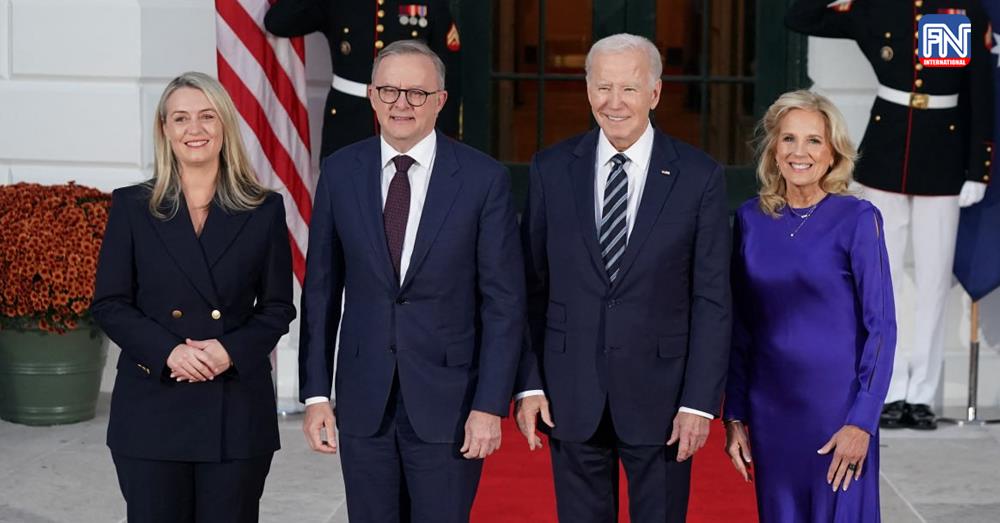WASHINGTON, Oct. 26 (SCMP) - US President Joe Biden and Australian Prime Minister Anthony Albanese announced an agreement on Wednesday to cooperate with Japan on advanced defence technology, one of several initiatives meant to solidify the nations’ engagement in the Indo-Pacific to counter a more assertive China.
The US and Australia will explore trilateral defence cooperation with Japan including on unmanned aerial systems, the White House said: “Our cooperation will enhance interoperability and accelerate technology transfer in the rapidly emerging field of collaborative combat aircraft and autonomy.”
Additionally, Australia will participate for the first time in two US-Japanese military drills, the Yama Sakura exercise later this year and Keen Edge next year, both in Japan.
The announcement came as Biden and Albanese, who is making a state visit to Washington this week, held a joint news conference at the White House on Wednesday.
While the two leaders spoke on a range of international issues – including their joint support of Israel in the wake of the Hamas attack, and their aid and supplies to Ukraine in its war against Russia – they unsurprisingly addressed the development of their still-new Aukus alliance.
Aukus – a trilateral security partnership of Australia, the US and Britain – has drawn criticism from China ever since it was announced in September 2021. Beijing said the pact arose from a “Cold War mentality” which would spur an arms race and harm regional stability and peace.
At the briefing, Biden said he was “confident” Congress would approve the financing needed to build the nuclear-powered submarines the US had pledged to Australia as part of the Aukus deal. Concern over the funding had been raised during Albanese’s trip.
“I’m confident that we’re going to be able to get money for Aukus, because it’s overwhelmingly in our interest,” Biden said.
The White House issued a supplemental budget request last week for US$3.4 billion to upgrade the domestic industrial base used to build submarines, along with a US$50 billion package that includes weapons for Ukraine and humanitarian aid for Israelis and Palestinians.
Congress has yet to consider either package because the House of Representatives has for three weeks lacked a speaker, the chamber’s leader, to bring bills to the floor for a vote.
Later on Wednesday, the Republican-controlled House finally approved a successor to the ousted speaker, Kevin McCarthy – Representative Mike Johnson of Louisiana – and expectations rose for legislation to move forward.
At the briefing, Biden recalled that Chinese President Xi Jinping had asked him if the submarine deal was “trying to surround China”.
“I said no, we’re not surrounding China. We’re just making sure that the sea lanes remain open,” Biden said.
“It’s about maintaining stability – stability in the Taiwan Strait, the Indian Ocean, the whole area – and I think it’s kind of increased the prospects for long-term peace rather than anything else,” Biden said.
Among other Aukus-related developments, the White House said that the US and Australia have begun Aukus-related training, with the first Australian military personnel graduating from a US “nuclear-power school” in July.
Additionally, the USS North Carolina battleship completed the first Aukus-related port visit to Australia in August.
During this state visit, Australia and the US also said they would strengthen their work together on a range of issues, including advanced technology and climate. Additionally, the two countries will offer infrastructure support for Pacific island nations, investing a US$65 million for subsea cables to boost connectivity for the nations.
The two countries plan to work collaboratively with commercial cable providers Google and Hawaiki Nui, in partnership with Pacific Island countries, to provide branching units for Federated States of Micronesia, Kiribati, Marshall Islands, Nauru, Papua New Guinea, Solomon Islands, Timor-Leste, Tuvalu, and Vanuatu, according to the White House.
They also plan to co-finance critical maritime infrastructure in Kiribati, including the rehabilitation of Kanton Wharf and Charlie Wharf in Tarawa, according to the White House.
In recent years, Washington has gradually stepped up its engagement among Pacific Island nations amid competition with China in the region.
The alliance between Australia and United States is an “anchor” to peace and prosperity in the Indo-Pacific, Biden said.
Albanese said that Australia wanted “a peaceful and secure region, but we want one as well that’s based upon the rule of law, and where national sovereignty including issues such as the South China Sea and the right of passage in that important waterway there, the East China Sea, the Taiwan Strait is respected”.
Albanese said he looked forward to a “constructive” dialogue during his visit to China next month, which will make him the first Australian prime minister to make such a trip in seven years.

Photo from Reuters